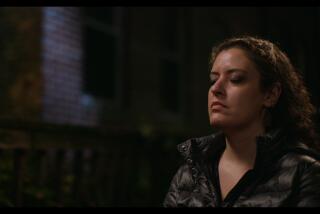Scientists explore using psychedelics to treat alcohol, drug disorders
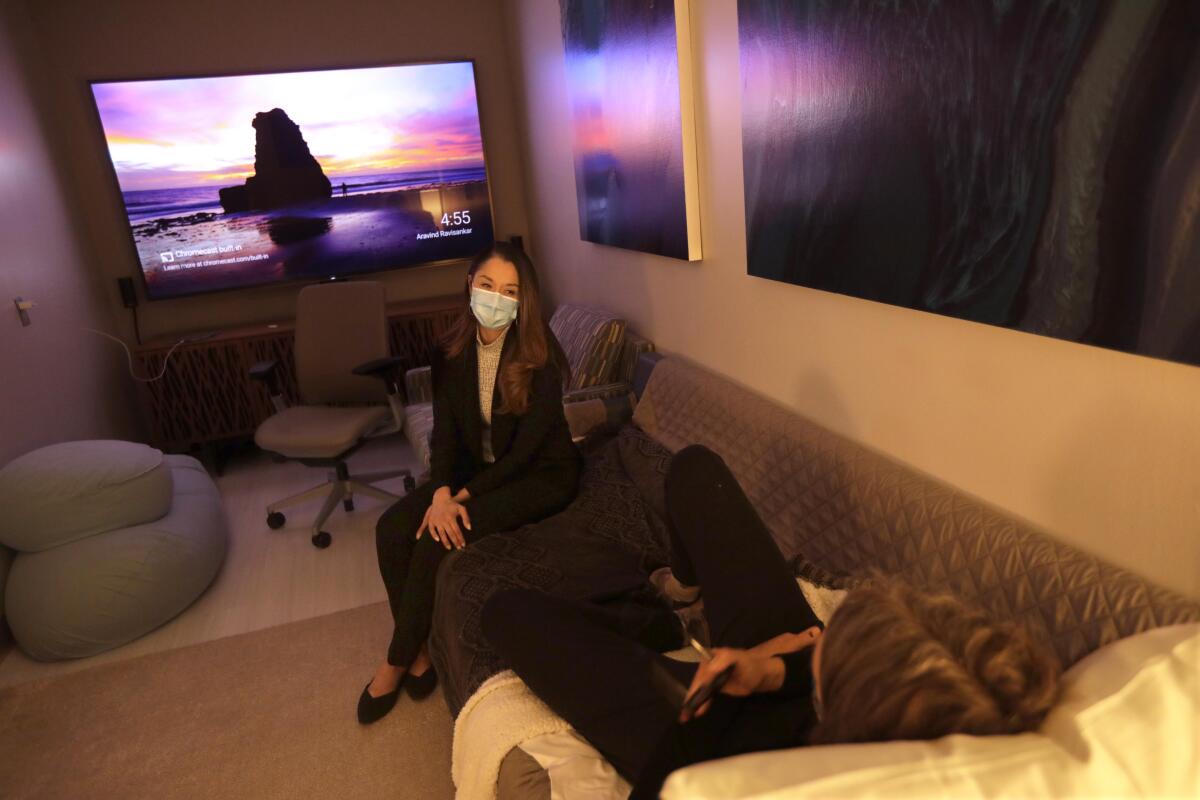
- Share via
Melanie Senn’s father, long dead, appeared to her as she lay back in the dimly lit room at the Santa Monica clinic, a mask over her closed eyes, and the psychedelic trip began.
More precisely, it was his thumb. It was disembodied and huge, materializing in her mind to wipe away her own image. Just as a parent might lick a thumb, she said, and use it to clean the dirtied cheek of a child.
“It wasn’t like an aggressive move,” said Senn, 51, recounting the experience. Her father’s thumb had appeared right after the word “goodbye” stretched before her, like a banner in the sky.
“It was like, ‘Goodbye. We’re going somewhere else. And you cannot take this version of yourself,’” she recalled.
Her father had died decades earlier after struggling with alcohol use disorder and bouts of homelessness. She didn’t see herself as an alcoholic — it was a word that seemed out of place in her stable life as an educator, wife and mother — but she had begun to think about how much wine she was drinking at night, the sapped energy and headaches she endured by day.
Senn, who lives in San Luis Obispo, said she had signed up for the clinical trial, hours away in Santa Monica, to see whether therapy with psilocybin, the chemical compound in “magic mushrooms” that can cause hallucinations, might change her relationship to a much more familiar and socially sanctioned drug.
“If my dad had had access to psilocybin treatment,” she had wondered before her trip at the Pacific Neuroscience Institute, “could that have helped him?”
Psilocybin and many other psychedelics are broadly prohibited under federal law, categorized by the Drug Enforcement Administration as having “no currently accepted medical use.”
Yet U.S. researchers have been legally scrutinizing possible uses of psychedelics in scores of clinical trials approved by the government, addressing their effects on anorexia, migraines and a range of other maladies.
The Food and Drug Administration has deemed psilocybin a potential “breakthrough therapy” for treating depression, a designation that could fast-track the path to new pharmaceuticals.
Popular interest in psychedelics has been bolstered by the books of Michael Pollan, whose writing inspired Senn to look up psilocybin trials. And money, long the limiting factor in psychedelic research, is pouring into the field from corporate investors and intrigued philanthropists.
Addiction treatment has been one of the most keenly watched areas of psychedelics research in recent years, as studies explore whether they could help people shake off the need for other substances, both legal and illegal.
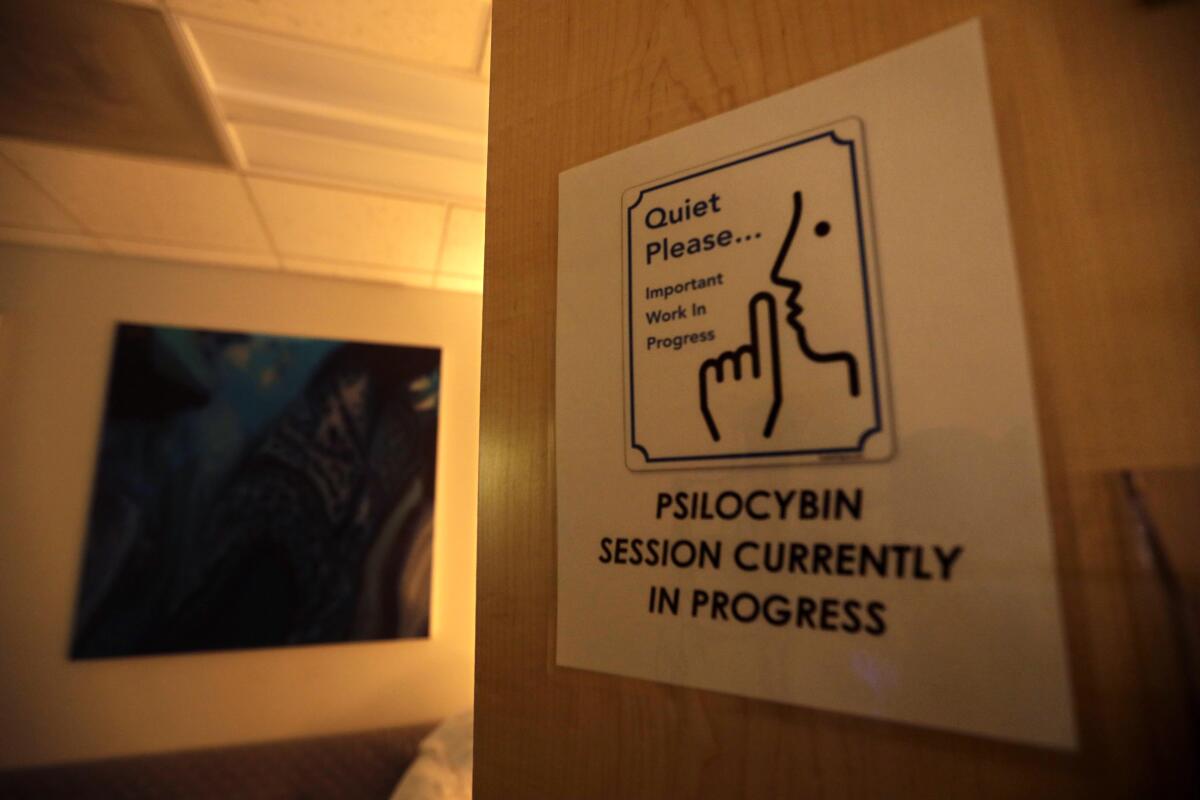
Early studies have shown promise with treating addiction to tobacco and alcohol. The question has gained urgency as the U.S. faces an overdose surge that is killing more than 100,000 people annually, the majority linked to opioids, and a spike in deaths tied directly to alcohol, which have hit their highest rate in decades.
Peter Hendricks, a public health professor at the University of Alabama Birmingham, said cocaine users have asked skeptically, “You’re going to help me stop getting high — by getting me high?” He is studying whether psychedelics paired with therapy could ease cocaine dependency.
Hendricks said he explains that psilocybin is not considered to be addictive. Some participants, he said, “will tell me, ‘Look, this sounds kind of crazy, but I’ve tried everything at this point, so I’m willing to give it a try.’ ”
At Johns Hopkins University, researchers examining whether psilocybin could help with tobacco cravings received a grant in 2021 from the National Institutes of Health — the first the agency has awarded in more than half a century to study therapeutic uses of a psychedelic drug.
Physicians in New York and New Mexico published a study this summer finding that patients treated with psilocybin and psychotherapy cut back more on heavy drinking than those who received psychotherapy and a placebo.
The possession and personal use of “magic mushrooms” and ayahuasca could be decriminalized under a new psychedelics bill introduced Monday backed by veterans.
Hendricks is exploring possible benefits for cocaine users. Others have hoped to turn the powers of psychedelics toward easing opioid addiction.
The striking thing about psychedelics is that they have shown promise in treating addiction to a range of substances, said Matthew Johnson, a psychiatry professor at Johns Hopkins University.
“It’s not simply quelling the cravings. ... It’s really allowing the person to wrestle with much deeper psychological questions at the heart of addiction.”
In addiction treatment, “we really are at a place where we need radical advances,” Johnson added. “As a field, we keep banging our heads against the wall.”
Experts say it’s unclear exactly why psychedelics seem to help some people with addiction.
Scientists have found that psilocybin acts on key areas of the brain that are important in addiction, said Dr. Lorenzo Leggio, a senior investigator with the National Institutes of Health whose research focuses on identifying new treatments.
Psilocybin also indirectly stimulates a receptor for serotonin, a chemical in the brain that plays a role in addictive behavior, Leggio said, and some research suggests that psilocybin increases “plasticity,” so that “the brain becomes easier to adapt and to adjust.”
Some researchers say a psychedelic trip appears to free the brain to make new connections and eject itself from familiar ruts — a tool that could help patients break loose from destructive ways of thinking.
Hendricks said many people with substance use disorders devote a lot of time and energy to thinking about their urges and how to satisfy them, but during a psychedelic experience, “for many people, there is this intense experience of awe where they think outside of themselves in a very profound way.”
“It’s one thing for me to tell you, ‘Hey, your drinking is negatively affecting your relationship with your family members,’” he said. “It’s another thing to have a very visceral and vivid experience in which it is shown to you.”
Johnson, who has studied addiction to tobacco, said smokers, after tripping on psilocybin, have relayed realizations about the psychological reasons they use cigarettes. Many had “experiences that sort of opened them up to a different way of viewing the world,” seeing it as “this miraculous gift.”
If you suddenly see life as a miracle, “the question of whether or not you’re going to be smoking just seems trivial,” Johnson said.
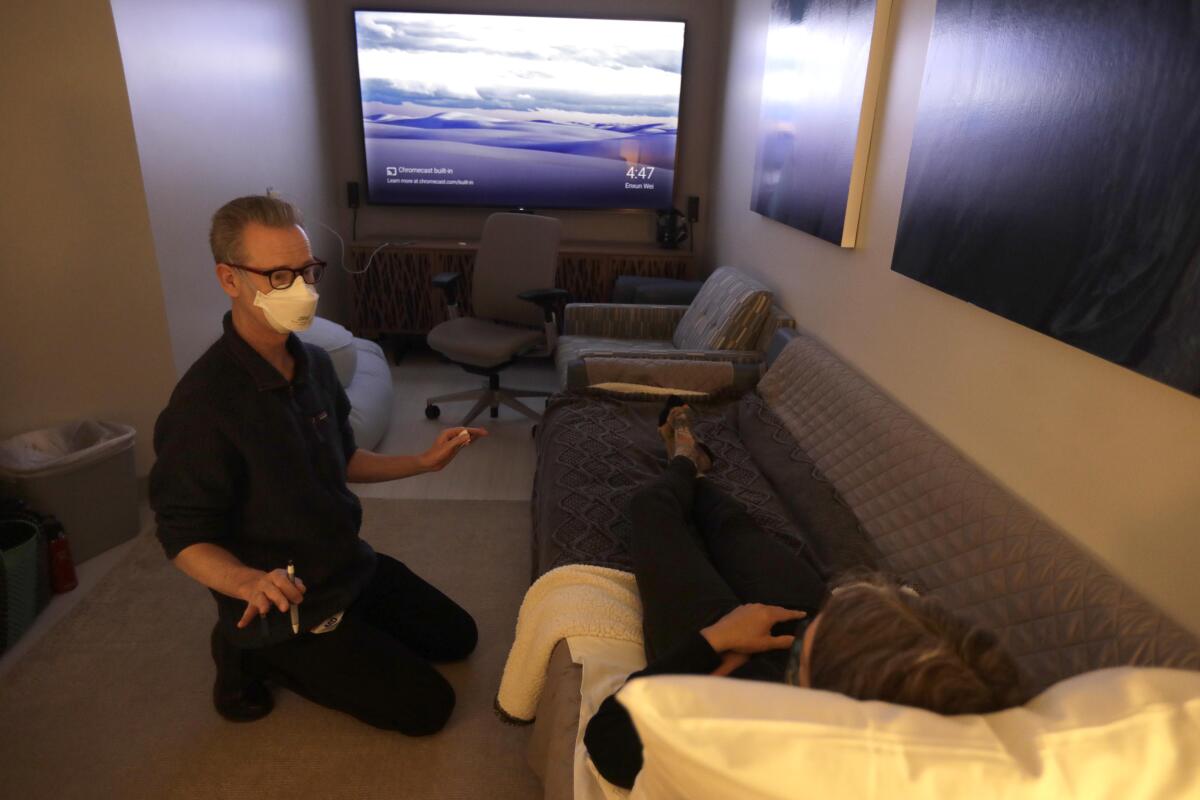
Leggio, like many others, cautioned that research on psychedelics is in its early stages. It’s unclear whether the hallucinations tied to psilocybin are critical to any therapeutic effects or could be disentangled from them in a new medication. Psychedelic research has also struggled to find a placebo that participants cannot easily distinguish from a psychedelic trip.
“There is a lot of excitement — and I share that excitement,” Leggio said. But “we also need to make sure that we don’t overlook safety.”
Psychedelics have known risks, especially outside a clinical setting where patients are being monitored, experts have warned.
People undergoing psychedelic trips may see things that are disturbing, experience increases in heart rate or blood pressure, panic and put themselves in danger or be vulnerable to exploitation. In rare cases, users may suffer ongoing problems such as paranoia or hallucinatory flashbacks, according to the National Institute on Drug Abuse.
As scientists probe possible benefits in therapy, some local laws on psychedelics have been eased.
In Oregon, voters passed measures to create a regulatory framework for the use of psilocybin in supervised settings and eliminate criminal penalties for possessing limited amounts of controlled substances, including psilocybin and many other psychedelics. Colorado voters in November passed a measure to decriminalize the personal possession of psilocybin and other psychedelic plants.
In 2022, California lawmakers weighed a bill proposed by state Sen. Scott Wiener (D-San Francisco) that would have allowed the possession of psilocybin and several other hallucinogenic drugs for personal or facilitated use. Among those lobbying for the California bill were military veterans who say psychedelic treatment helped them with addiction and trauma.
“It’s not that it’s an overnight panacea or miracle, but it certainly was far more effective than anything we had tried to date,” said Amber Capone, who had been preparing to leave her husband, Marcus, before he underwent treatment in Mexico with the psychoactive substance ibogaine. The couple have founded a nonprofit, Veterans Exploring Treatment Solutions, that helps veterans get such therapies abroad.
Opponents of the California bill contended that therapeutic uses should not be conflated with decriminalizing such drugs more broadly. The group Crime Victims United of California argued that a possible therapeutic benefit “by no means justifies their wholesale legalization for the masses — who are not necessarily under the watchful eye of a licensed therapist.”
The bill was scaled back to a proposed study, then shelved in the fall. Wiener pledged to try again and recently introduced a revised version of the proposal.
In Santa Monica, Dr. Keith Heinzerling has long wondered about those crucial moments that people talk about in Alcoholics Anonymous.
“They talk about these epiphanies, where the switch flips and then they just feel different,” said Heinzerling, who was an addiction-medicine doctor and researcher at UCLA before joining the Pacific Neuroscience Institute. “Myself and some of the clinicians were always like, ‘How do you facilitate that?’ Because people would try, try, try — and it would happen at the least expected time.”
Psychedelics seem to him like one way to help patients get to those transformative moments — “a roller coaster that takes you on a tour of your inner self.” Heinzerling describes psychedelics as the most empowering model for therapy he has found.
“It’s not mind control,” he said. “It’s a door that you can choose to open.”
The Treatment & Research in Psychedelics program — better known as TRIP — has let patients, through federally regulated clinical trials, open that door in a softly lit room with a comfortable sofa and attentive therapists.
One of the latest studies, which recruited participants with alcohol use disorder, sought to gauge the safety and tolerability of playing a video — with classical music trickling over majestic scenes of butterfly wings, mountain ridges and waterfalls — to ease patients into the experience before they cover their eyes.
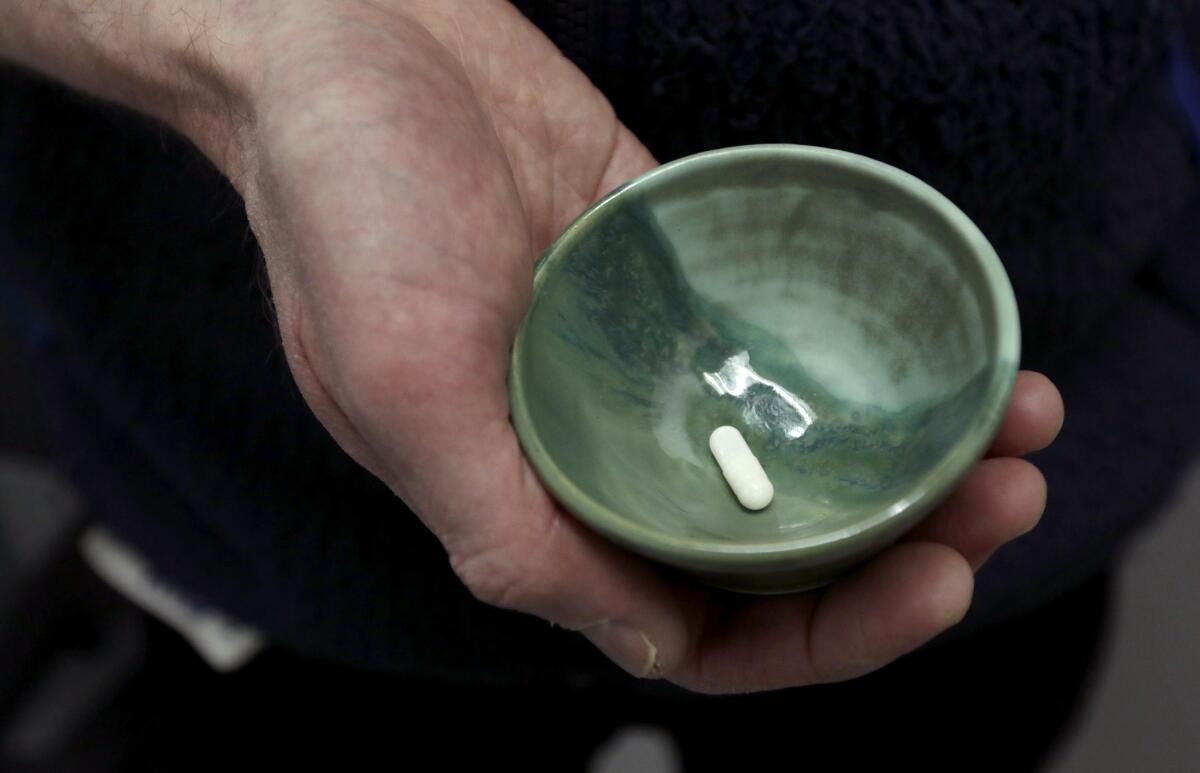
Heinzerling said the therapists reassure participants that “we’re going to keep your body safe here — and allow you to let your mind go.” After the psilocybin session, they meet again weekly through the course of the study to talk about the experience, with therapists helping patients process what they felt and saw.
Senn, one of a score of people participating in that pilot study, called it “hands-down the most profound experience of my life.” During her trip, she said, she experienced her father gently wiping away her image — “almost like he was erasing my ego” — then taking her to a celestial place that she strained to describe in words.
“I’m not a religious person,” she said, “but I truly think I have now been cured of my atheism.”
At one point, she saw her own children, connected to her with long, black umbilical cords; at another, she opened her mouth, and incandescent light poured out of her like a bulb as the message “No one is angry at you” resounded. She saw her mother, shrouded in a dark covering of wraiths, bones and melting faces, and felt her overwhelming grief.
“I felt completely wrung out afterward,” she said. “Kind of just raw, but also, like, soft and in awe.” A friend picked her up from the Santa Monica clinic and drew her a bath, where she soaked for hours.
Her husband joked on the phone, “Are you coming back a teetotaling vegan?” This was, after all, a study related to alcohol that required her to track how many drinks she had each day.
Senn said the depth of her psychedelic experience feels at odds with making simple declarations like “I’m not going to drink anymore.” But tripping through the cosmos with her long-deceased father did bring home to her that “you have all these connections. You have all this love. ... You don’t have to hurt yourself.”
Months after taking psilocybin, she drank less, then not at all. Senn said her psychedelic trips were one part of a bigger journey that included changing her career, reading books on addiction, meditating, writing and practicing yoga. The transcendent beauty of her experience, she said, had made drinking seem dull and limiting.
“Seeing this sublime connection is making me feel so alive,” she said. “So much more alive than drinking myself to sleep.”
More to Read
Sign up for Essential California
The most important California stories and recommendations in your inbox every morning.
You may occasionally receive promotional content from the Los Angeles Times.



